Blast Off With Sun Ra's "Space Is The Place"

Time for another visit to UBUWEB (ubu.com) for a trip into a strange mind. Today's strange mind is Sun Ra, and we're here to see Space Is The Place, a feature film by Sun Ra.
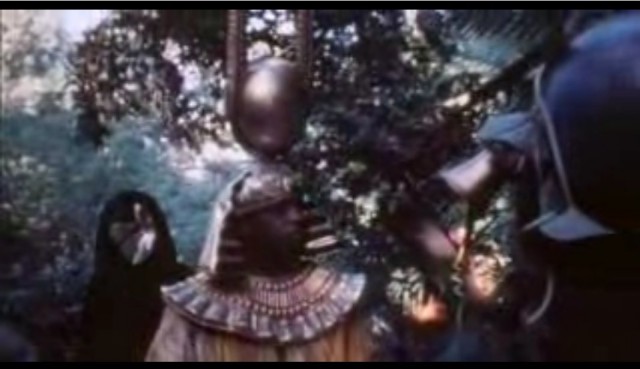
Sun Ra was a jazz musician, poet, philosopher, "afrofuturist", and Black Nationalist, who was active from the 1930s until the 1990s when he passed away. He was also both a brilliant musician and out of his gourd. Critic Scott Yanow called Sun Ra the most controversial of black musicians. Among Ra's many eccentricities was insisting that he bodily visited Saturn at the behest of aliens, that he was a member of an "angel race", that his birth name had nothing to do with him, and that he was related to Elijah Muhammed, founder of the Nation of Islam. As you can see in the film, he also had a serious crush on Egyptian mythology (the name "Ra" came from the Egyptian sun god).
But his quirks were widely tolerated in the music world. He rubbed elbows with contemporaries Fletcher Henderson, Duke Ellington, Fats Waller, Coleman Hawkins, and Stuff Smith. His own ensemble was called the "Arkestra" (ARK-estra, as in Noah's Ark, get it?), and grew to encompass a number of cutting edge jazz names of the '60s and '70s. If you're picking up a vibe of George Clinton (of Parliament / Funkadelic fame), you're on the right channel; Clinton once cited Sun Ra as an influence and said of him "Yeah, Sun Ra's out to lunch - same place I eat!"
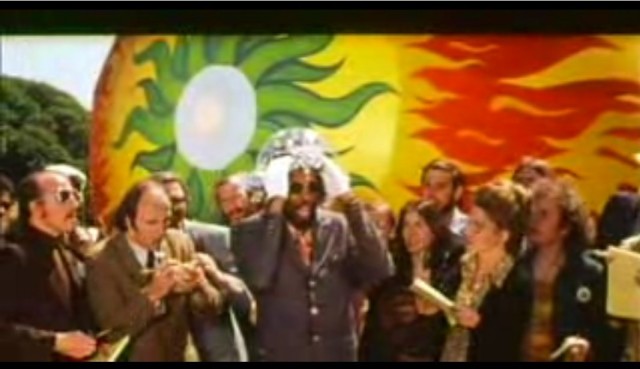
BTW, this film is checkered with nudity and offensive language (and gobs of outspoken race-related themes), so be warned. It's also hard to follow without a bit of explanation - that's what we'll provide here. The soundtrack by the same name is available, and then if you listen to it you'll now know what the blazes is going on, thanks to this article. See how it works?
Without further ado, let's blast off:
We start on the planet Saturn, which looks kind of like a scene from Alice in Wonderland. Except we have an Egyptian god instead of Alice. Sun Ra observes that "the music is different here" and resolves to set up a colony for black people there. Except his method of doing this is to use music to transport the black race.
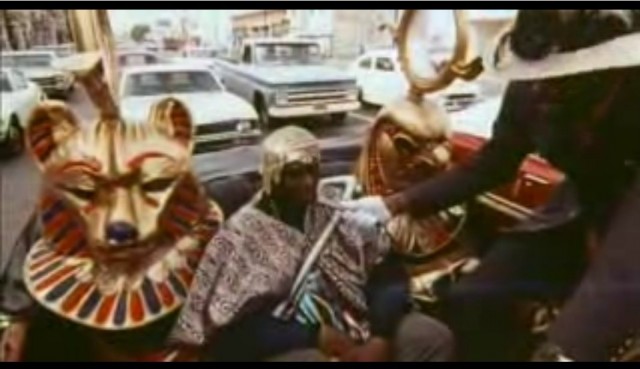
Working against him will be one Overseer (played by Ray Johnson), who is the devil to Sun Ra's god. First they have a battle of wills in a corny piano lounge in post-WWII Chicago, where Ra's performing as "Sunny Ray". The battle tears the lounge apart and all hell breaks loose. Suddenly the Overseer and Sun Ra are teleported to the desert where the Overseer challenges Sun Ra to a game, with the stakes being the salvation of the black community. The challenge takes the form of some kind of card game and this provides the frame for the rest of the story.
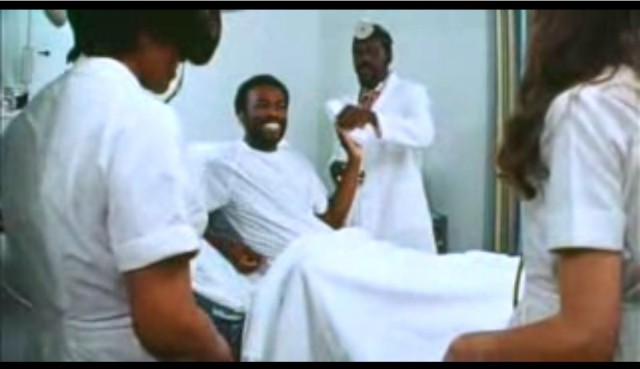
Other characters:
- Jimmy Rey - He represents the media; he's also kind of the symbol for black people who have sold out to get rich in the white people power structure. He starts out as an announcer broadcasting Sun Ra's spaceship landing.
- Two balding white guys from NASA. Apparently they're the white power structure trying to prevent blacks from achieving their goals. They start out wire-tapping Sun Ra's dealings like a couple of CIA goons.
- A pool hustler. He's an apparent "side-bet" between Sun Ra and the Overseer, and represents the black community's distraction by drugs and gambling, which stops them from rising out of the ghetto.
- Sun Ra's escort: Two silent Egyptian figures in elaborate, neck-breaking head-dresses.
- The Overseer's escort: Two prostitutes / sirens / familiars / succubi / who knows? They're treated like Castor and Pollux twins, one white and one black. The Overseer uses them to seduce humans to his dark side.
- A drunk stumble-bum. Seems to represent the blacks who have given up hope and live in oblivion.
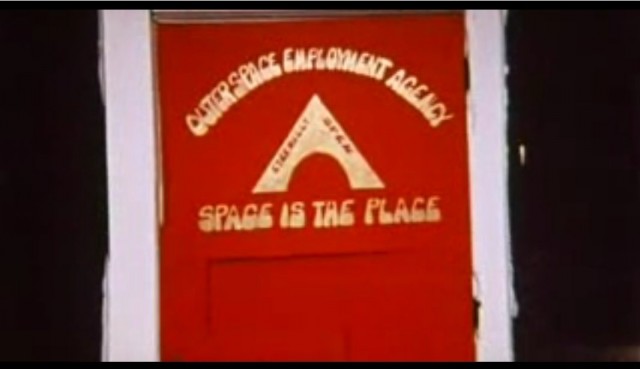
The whole story and the individual character and plot threads take the form of a spiritual battle between Sun Ra and the Overseer, two supernatural beings who zap around Oakland, California, trying to one-up each other. Like any good morality play, they both have lots of tricks up their sleeve. Tied into all this are the two NASA guys, who just keep on getting more villainous with every scene as they rush to keep up with all the shenanigans and try to stop Sun Ra's plans, by every means necessary.
It's all corny, dated, weird, spacey - and truckloads of fun. The script is chock-full of stunning lines like "You can bet your tits on that." and "That's what I call cookin' with grease!" and "He's not dealing in Black Magic Soul Power." There's some very funny Zen-like conversations, some of them straight out of a Kurt Vonnegut novel. There's cosmic mystical speeches by Sun Ra trying to preach enlightenment to the masses. It's like one big jive passion play, and while it is never Oscar material, damned if it doesn't hold your attention.
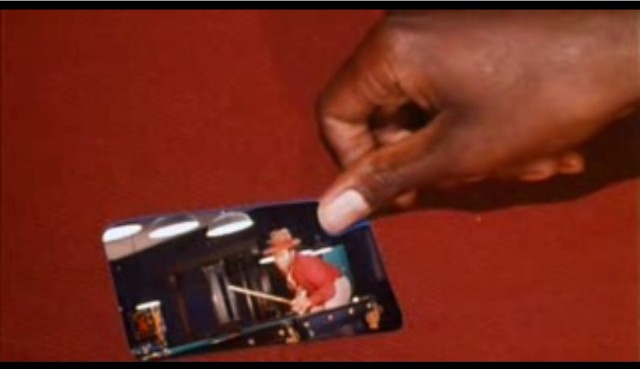
Have we mentioned the music yet? Let's not call Sun Ra "the black Frank Zappa", so do not think of that phrase again. No, stop that! Sun Ra plays with experimental forms, free jazz, bebop, "space jazz", and... the heck with explaining it, we have to call it "Sun Ra music" and leave it at that. Sun Ra was among the first jazz musicians to use two basses, electric bass, electronic keyboards, poly-rhythms, and group free-form improvisations, so innovation was his middle name.
There's also June Tyson (the soul sister in the big sunglasses who provides lead vocals on the music), chanting Sun Ra's hypnotic, repetitive lyrics in blues-shouter style. If you want to hypnotize people into joining your UFO cult, June Tyson is your ticket.
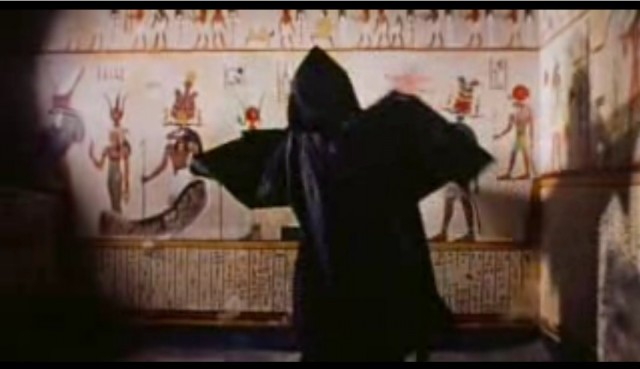
Well, there it is, presented for your consideration. While it's a cultural relic of avant-garde film-making now, you'd better believe that it was influential on a big chunk of music history.

 Anime to watch for the soundtracks… and other reason...
Anime to watch for the soundtracks… and other reason... .jpg) Dolly, we need you
Dolly, we need you  The Stranger Things Effect: How new media is drawing...
The Stranger Things Effect: How new media is drawing...  The most underrated soundtrack of the early 2000s
The most underrated soundtrack of the early 2000s  Buy the Soundtrack, Skip the Movie: Brainscan (1994)
Buy the Soundtrack, Skip the Movie: Brainscan (1994)  Let’s Go to the Hop - Ignore That Door’s Four Bunnie...
Let’s Go to the Hop - Ignore That Door’s Four Bunnie...  Forgotten Weird Music Videos of the Ancient 80s | vol 3
Forgotten Weird Music Videos of the Ancient 80s | vol 3  Forgotten Weird Music Videos of the Ancient 80s | vol 2
Forgotten Weird Music Videos of the Ancient 80s | vol 2  Forgotten Weird Music Videos of the Ancient 80s | vol 1
Forgotten Weird Music Videos of the Ancient 80s | vol 1  Let’s Chase Taylor Swift Rumors
Let’s Chase Taylor Swift Rumors  When the Beatles Touched Off a Movie War
When the Beatles Touched Off a Movie War  When Mike Bloomfield Composed a Soundtrack For Andy ...
When Mike Bloomfield Composed a Soundtrack For Andy ...  Yet Another List of Bad Song Covers
Yet Another List of Bad Song Covers  Why Does Everybody Pick On Liberace?
Why Does Everybody Pick On Liberace?  Trainspotting Soundtrack Revisited : One of the Best...
Trainspotting Soundtrack Revisited : One of the Best...  Nicki Minaj and Megan Thee Stallion: Bringing Back t...
Nicki Minaj and Megan Thee Stallion: Bringing Back t...  Quirky Songs About Los Angeles
Quirky Songs About Los Angeles  Penguin Pete’s Obligatory Penguin Cafe Orchestra Post
Penguin Pete’s Obligatory Penguin Cafe Orchestra Post  Heart | How Bad Are Those Animals?
Heart | How Bad Are Those Animals?  That Time Ronnie James Dio Saved Black Sabbath’s Bacon
That Time Ronnie James Dio Saved Black Sabbath’s Bacon  What is a Left Hand Path? - Entombed and Swedish Dea...
What is a Left Hand Path? - Entombed and Swedish Dea...  Song Analysis Corner: Convoy (1975)
Song Analysis Corner: Convoy (1975)  What’s Up With Margaritaville?
What’s Up With Margaritaville?  This Album Links Duran Duran, Andy Warhol, and Kurt ...
This Album Links Duran Duran, Andy Warhol, and Kurt ...  Your Back-To-School Playlist
Your Back-To-School Playlist  Cucumber Castle | the other Bee Gees Movie
Cucumber Castle | the other Bee Gees Movie  Danny Elfman Scores New Film; Other Movie Weirdness!
Danny Elfman Scores New Film; Other Movie Weirdness!  Sparks Is Not Crying in Their Latte
Sparks Is Not Crying in Their Latte  Travis Scott : Rapper, Cannabis Entrepreneur, Filmmaker
Travis Scott : Rapper, Cannabis Entrepreneur, Filmmaker  Anders Runestad – Author and Music Blogger
Anders Runestad – Author and Music Blogger  What If They Really ARE Giants?
What If They Really ARE Giants?  Prince’s Underrated Under the Cherry Moon
Prince’s Underrated Under the Cherry Moon  Six Degrees of Blondie
Six Degrees of Blondie  Six Degrees of: Adam and the Ants
Six Degrees of: Adam and the Ants  Discovering Beat-Club | Vintage West German Music Show
Discovering Beat-Club | Vintage West German Music Show  Eurovision Contest Winners part 2
Eurovision Contest Winners part 2  Song Analysis Corner: Snoopy vs. the Red Baron | The...
Song Analysis Corner: Snoopy vs. the Red Baron | The...  Eurovision Contest Winners part 1
Eurovision Contest Winners part 1  KISS SUXX!
KISS SUXX!  You Haven’t Met Your Last Reefer Man
You Haven’t Met Your Last Reefer Man  Ruth Underwood and the “Zappa sound”
Ruth Underwood and the “Zappa sound”  Catchy Commercial Earworms | vol 2
Catchy Commercial Earworms | vol 2  Song Analysis Corner: “Trouble Every Day” | Frank Zappa
Song Analysis Corner: “Trouble Every Day” | Frank Zappa  Blues Music For Your Great Recession
Blues Music For Your Great Recession  We Can Fix America If We Just Bring Back Schoolhouse...
We Can Fix America If We Just Bring Back Schoolhouse...  Song Analysis Corner: Istanbul (Not Constantinople)
Song Analysis Corner: Istanbul (Not Constantinople)  Music To Shoot Down UFOs To
Music To Shoot Down UFOs To  Are You Ready For AI Music?
Are You Ready For AI Music?  How Dreary Was 1970s Adult Contemporary?
How Dreary Was 1970s Adult Contemporary?  I Just Called To Say Stevie Wonder's Song Deserved a...
I Just Called To Say Stevie Wonder's Song Deserved a...  "Knock On Wood" | The Real Song To Remember From Cas...
"Knock On Wood" | The Real Song To Remember From Cas...  Dr. Dre's Not Gonna Take This Anymore
Dr. Dre's Not Gonna Take This Anymore  Apache - The Shadows | A Surf-Rock Safari
Apache - The Shadows | A Surf-Rock Safari  New Year : New Music Artists You (Probably) Haven't ...
New Year : New Music Artists You (Probably) Haven't ...  Song Odyssey | I Put A Spell on You
Song Odyssey | I Put A Spell on You  KMart and S.S. Kresge | Music Mystery?
KMart and S.S. Kresge | Music Mystery?  Did I Ever Introduce You To Horrorpunk?
Did I Ever Introduce You To Horrorpunk?  Song Analysis Corner : The Coffee Song
Song Analysis Corner : The Coffee Song  Duran Duran Finally Got Inducted
Duran Duran Finally Got Inducted  That Time Taylor Swift Broke Ticketmaster
That Time Taylor Swift Broke Ticketmaster 